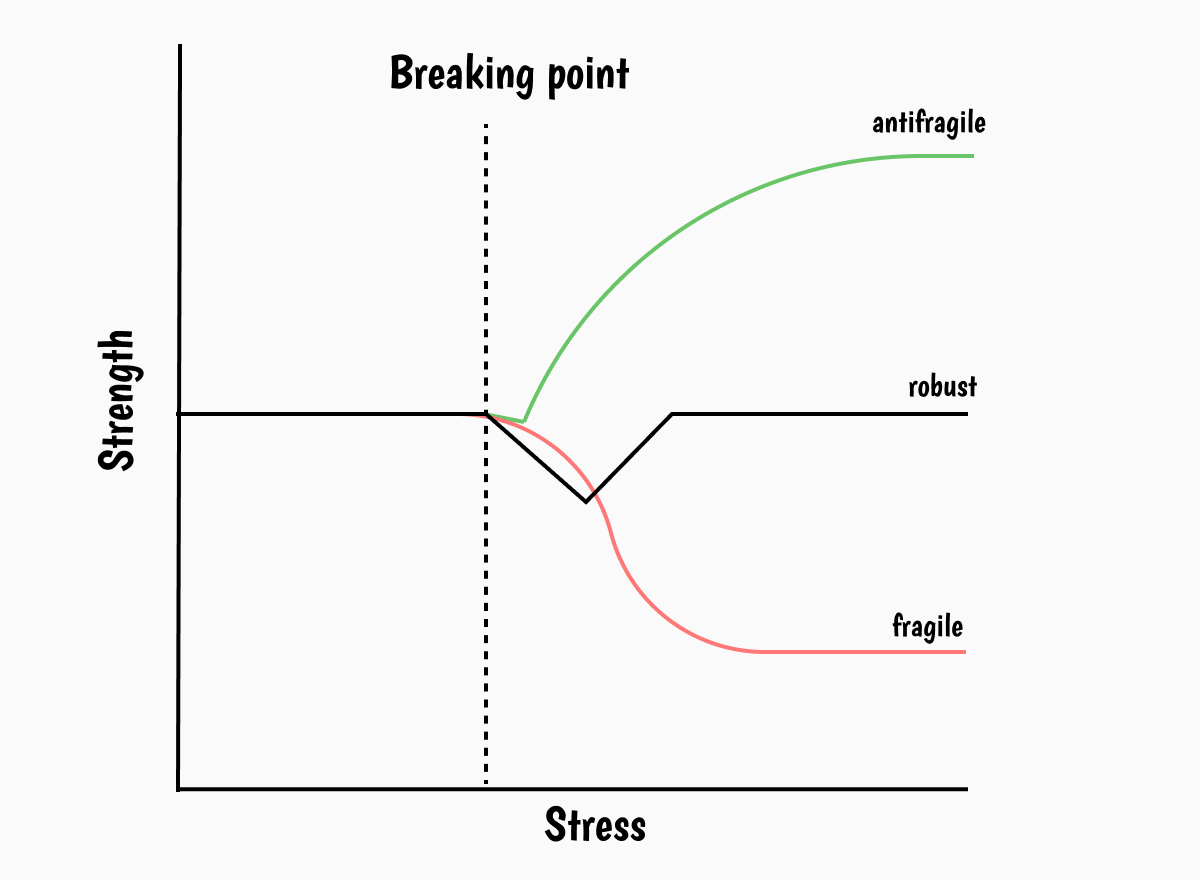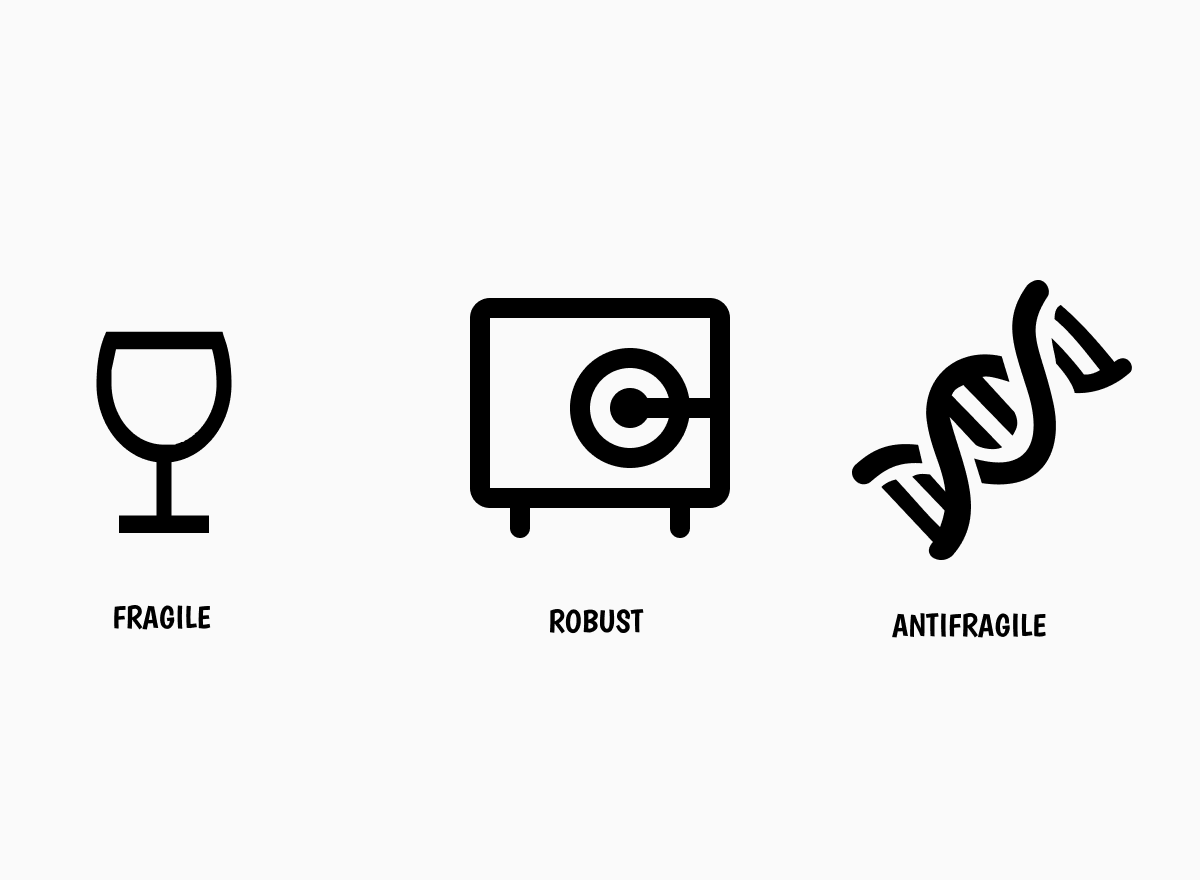ANTIFRAGILE - Word "FIGHT" got a novel name
Three types of response to stress situation : Fight-Flight-Freeze.
Forget about robustness - Become Antifragile. This is new term I learn from Nicholas Nassim Taleb book - Antifragility.
So, what is Antifragility?
“Antifragility is beyond resilience or robustness. The resilient resists shocks and stays the same; the antifragile gets better.” as per Nicholas Nassim Taleb
Examples:
Fragile (Harmed by Tension) = Sword of Damocles (Mythical Hero Weapon) OR WINE GLASS
Robust (Harmed by Tension) = Phoenix Bird (Mythical Creature) OR Steel Box
Antifragile (Harmed by Tension) = Hydra (Mythical Creature) OR DNA
“That which does not kill us makes us stronger.” - Friedrich Nietzsche
“It is not the strongest species that survive, nor the most intelligent, but the ones most responsive to change.” - Charles Darwin
Here are the 6 key life changing insights to become Antifragile:
#1. Actions speaks louder than words
Suckers try to win arguments, non-suckers try to win. Be in the group of doers rather speakers or criticizers.
“Action reduces Fear and Increase courage.” - John C. Maxwell
“The price of greatness is responsibility.” - Winston Churchill
#2. Assign ownership to decision advisor
The psychologist Gerd Gigerenzer has a simple heuristic. Never ask the doctor what you should do. Ask him what he would do if he were in your place. You would be surprised at the difference.
“Once you see the world from a producer perspective, your perceptions sharpens like a fine tuned radio frequency, from static to clear stereo sound. Suddenly, opportunities have clarity, ideas surface, and scams are exposed.” - MJ Demarco
“It is the mark of a charlatan to explain a simple concept in a complex way.” - Naval Ravikant
#3. Power of productive procrastination
Few understand that procrastination is our natural defence, letting things take care of themselves and exercise their antifragility; it results from some ecological or naturalistic wisdom, and is not always bad — at an existential level, it is my body rebelling against its entrapment. It is my soul fighting the Procrustean bed of modernity.
“All of humanity's problems stem from man's inability to sit quietly in a room alone.” - Blaise Pascal
#4. Specialized learning
Some can be more intelligent than others in a structured environment — in fact, school has a selection bias as it favors those quicker in such an environment, and like anything competitive, at the expense of performance outside it. Although I was not yet familiar with gyms, my idea of knowledge was as follows. People who build their strength using these modern expensive gym machines can lift extremely large weights, show great numbers and develop impressive-looking muscles, but fail to lift a stone; they get completely hammered in a street fight by someone trained in more disorderly settings. Their strength is extremely domain-specific and their domain doesn’t exist outside of ludic — extremely organized — constructs.
In fact, their strength, as with over-specialized athletes, is the result of a deformity. I thought it was the same with people who were selected for trying to get high grades in a small number of subjects rather than follow their curiosity: try taking them slightly away from what they studied and watch their decomposition, loss of confidence, and denial. (Just like corporate executives are selected for their ability to put up with the boredom of meetings, many of these people were selected for their ability to concentrate on boring material.) I’ve debated many economists who claim to specialize in risk and probability: when one takes them slightly outside their narrow focus, but within the discipline of probability, they fall apart, with the disconsolate face of a gym rat in front of a gangster hitman.”
“Anyone who stops learning is old, whether at twenty or eighty.” - Henry Ford
#5. Nature
If there is something in nature you don’t understand, odds are it makes sense in a deeper way that is beyond your understanding. So there is a logic to natural things that are much superior to our own. Just as there is a dichotomy in law: ‘innocent until proven guilty’ as opposed to ‘guilty until proven innocent’, let me express my rule as follows: what Mother Nature does is rigorous until proven otherwise; what humans and science do is flawed until proven otherwise.
“What we observe is not nature itself, but nature exposed to our method of questioning.” - Werner Heisenberg
#6. Trial and error
The minute I was bored with a book or a subject I moved to another one, instead of giving up on reading altogether — when you are limited to the school material and you get bored, you have a tendency to give up and do nothing or play hooky out of discouragement.
The trick is to be bored with a specific book, rather than with the act of reading. So the number of pages absorbed could grow faster than otherwise. And you find gold, so to speak, effortlessly, just as in rational but undirected trial-and-error-based research. It is exactly like options, trial and error, not getting stuck, bifurcating when necessary but keeping a sense of broad freedom and opportunism.
Trial and error is freedom.
“Anyone who has never made a mistake has never tried anything new.” - Albert Einstein
#7. Negativa aka Negativity
“Via negativa” means “through negation”. Nassim Taleb calls the idea of giving up the excess.
Complex systems, such as a person, business, or society, are non-linear.
In their case, the principle “the more effort you put in, the better the result” or “the larger the organization, the more effective it is” does not work.
The increase is useful to some extent and then begins to harm.
Large cinema halls can bring more profit to owners, but if the number of seats becomes redundant and the width of the doors does not increase, the cinema will become more fire hazard.
A case in point occurred in New York in the 1930s. Doctors examined 389 children, of which the 174th recommended to remove the tonsils. The remaining 215 people were sent to other doctors, who prescribed surgery for another 99 of them. The remaining 116 patients were examined by a third group of doctors and decided to remove the tonsils from another fifty-two of them. In fact, 4% of children need such an operation from strength. So it is better not to rush with surgical treatment if there are no vital indications for it and its need has not been confirmed by several doctors.
When we lack knowledge of a subject, it will be much easier to explain what it is not, and not what it is. Knowledge “through negation” is important for our picture of the world. When the Pope asked Michelangelo how he managed to create a beautiful statue of David, the sculptor replied: “I just cut off everything that is not David.” Excessive amounts of information prevent us from separating important news from the noise and adequately responding to them.
Excessive wealth makes you worry about how to protect your savings. Excessiveness in food causes obesity. From constant fuss, overstrain occurs. Therefore, to refuse something, such as fasting, taking a break from social networks and not accepting unnecessary dietary supplements, is useful.
“Ninety percent of everything is crap.” - Theodore Sturgeon
Conclusion
Anti-fragility, the ability to get better due to difficulties, is necessary for us to survive. In order to develop antifragility in oneself, one must fall into situations of not critical risk. Protect yourself first and only then embark on an adventure.
“The best way to make sure you’re alive is to check if you like change.” - Nicholas Nassim Taleb
Theories are not as important as practical skills: develop your skills by trial and error.
In terms of efficiency, “less is more.” Refuse excessive.
Do the words “uncertainty” and “risk management” make you shudder or vice versa lazily wave away? Then this event is for you!
“Taleb turned my worldview around. I looked at the world with different eyes” - Daniel Kahneman
Thanks for Reading…
Follow for visuals at | Facebook | Twitter | Instagram | LinkedIn | Pinterest | Reddit |





